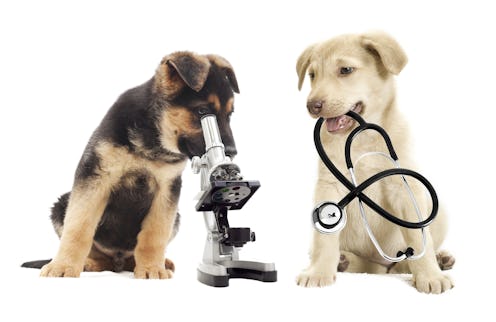Life
Symptoms Dog-Owners Should Look Out For

Being a dog owner is an amazing and rewarding experience — but like many wonderful things, it comes with great responsibility.
You probably already know that a young pup should have an annual vet visit and dogs older than 8 to 10 years should have two visits each year. But an occasional extra visit might be worthwhile in certain cases.
If you identify the following symptoms in dog's behavior, don’t panic — although a vet visit is a wise precaution, many of these ailments are entirely, and often easily, treatable.
I spoke with Dr. Ann Hohenhaus of the Animal Medical Center of NY about what dog owners should keep their eyes open for when they're considering calling the vet.
Weight Loss or Gain
Both weight loss and weight gain could signify a problem. However, pet owners tend to not be the most astute observers of fluctuations in their pet’s weight. Hohenhaus encourages walking by the vet’s office and asking to use the scale every so often, a request she says they will happily oblige.
“Weight loss is more commonly a sign of disease in dogs than weight gain,” Hohenhaus says. “Weight gain is a little more unusual.” It can stem from retaining fluid, an under-active thyroid, a distended abdomen, or an adrenal gland disease.
Drop in Activity
A decrease in your dog’s activity could mean the dog is anemic, has joint pain, heart problems, arthritis, or just feels weak and low-energy. "Almost any disease has decreased activity associated with it — it's a general finding, but an important one," Hohenhaus says.
Scratching, Licking, or Chewing
Any of these three symptoms means your pet is itchy for some reason — and it’s by no means uncommon. According to Hohenhaus, allergies are the number one reason for vet visits, as reported by pet insurance companies. There is allergy medicine for dogs, and they also are sometimes prescribed allergy medicines made for humans. There are even allergy shots available.
Bad Smell
Any unusual odor your otherwise clean dog is emitting is something to examine further. If you notice a smell, Hohenhaus recommends immediately taking a look at the dog’s ears, skin, anal glands, mouth, and teeth. Still, it’s worth having a professional take a look to pinpoint where it is coming from and if it might be an infection.
Vomit and Diarrhea
Dogs, as any dog owner knows, will occasionally throw up. "If your dog throws up once, I'm not that worried about it," Hohenhaus says.
However, if your dog is continually throwing up, or throwing up in conjunction with diarrhea, it is likely that something is wrong. The vet can check for intestinal parasites, or in the rare case the dog got into the trash and ate something that is stuck in its stomach or intestine, the vet can take care of this more urgent situation.
Drinking More Water Than Usual
If the water dispenser is going down faster than normal, it may be that your pup is be more than just thirsty! If you notice your dog going out of his or her way to increase water intake — the bowl is dry, the dog is trying to get more water from another pet’s bowl, or the dog is going to the toilet for extra water (i.e. making an effort!) — this can be a sign of diabetes, a kidney problem, or an adrenal gland problem, and is an important observation to get to your vet’s attention.
Cough and Sneeze
As with people, coughing or sneezing could just be an upper respiratory infection (a.k.a., a cold), kennel cough, or pneumonia. Your vet will likely be able to help alleviate some of your dog’s symptoms though, so again — worth a trip.
Bleeding
“Your pet really shouldn’t bleed, anywhere,” Hohenhaus says. If you see blood, it is a problem. “The only time it might be normal is for a female dog in heat who might drip a little blood from their vulva, but assuming that you have a spayed female dog, there shouldn’t be blood coming from anywhere.”
Dogs can also get nose bleeds, a cut in their foot, or blood in their urine. If there’s a bad cut, a vet might do a couple stitches, and if there is blood in the pup’s stool, it is advisable to test the stool and check for parasites. Bleeding in the mouth could be a dental problem. Your vet will help you get to the root of the issue.
Unexpected Accidents
Dogs face many of the same health problems that we do. Symptoms such as changes to bowel movements, blood in urine, or accidents in the house could mean similar things as they might for us — bladder stones or a U.T.I. — and needs to be treated. They’re uncomfortable for our, dogs too!
Limping
While this doesn’t necessarily mean something is wrong, limping can be a sign of bone cancer, in which case it is best to get a vet involved immediately. However, even if it traces back to a twisted ankle, a veterinarian’s care can only help. Limping could also point to a ruptured ligament or arthritis.
Lump, Swelling, or Growth
A lump anywhere on the body, in the mouth, back, feet, or toes is worth getting checked out. The vet will do a very simple procedure — a fine needle aspirate — something Hohenhaus says they do “100 times a day to get a quick answer as to what the bump might be.” Many are totally benign, but it’s best to check, especially since it is not hard to do.
Image: Aleksandr/Fotolia